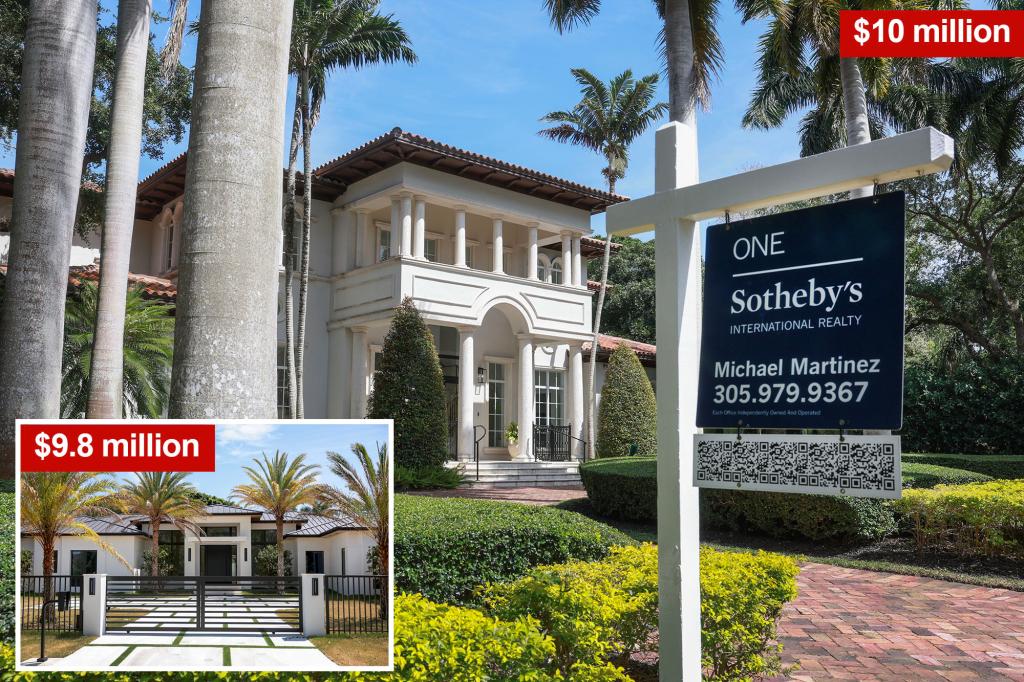Real estate inventory in parts of Florida is surging to uncomfortable levels — and sellers are beginning to slash prices, according to a report.
On the west coast of Florida, the number of houses up for sale and the rate at which their current owners are cutting asking prices is soaring, according to a report from real estate company Redfin released Thursday.
Redfin found that in the western parts of the state, whose coastline is on the Gulf of Mexico, inventory in Cape Coral and North Port has jumped the most, about 50% year-over-year as of March — more than any other US metro.
Trendy North Port-Sarasota saw homes for sale rise 48%, while the figure in upscale West Palm Beach, known to be home to wealthy snowbirds during the Northeast’s cold winters, rose a more modest 20%.

Of the 10 cities where sellers are most likely to slash their list prices, five alone are in Florida, including North Port-Sarasota — which had the highest share of listings reducing their prices in the country, at 48% — as well as Tampa, Cape Coral, Orlando and Jacksonville, Redfin found.
In recent years, “the North Port metro was one of the most competitive housing markets in the country because it was affordable for remote workers and there was a shortage of homes for sale, but none of those things are true today,” Eric Auciello, Redgin’s sales manager said in the report that was earlier reported on by Fortune.
“Sarasota, in particular, has been overvalued for decades, and the chickens have finally come to roost.”
As a result, many aspiring homeowners have been priced out of Florida altogether, instead opting for North Carolina or Tennessee to get more bang for their buck.
“Out-of-town homebuyers no longer see Florida as a place to get amazing value,” Auciello added.
Part of the reason: an insurance crisis, according to Redfin, which has been throwing a wrench into home purchases and delaying deals.
At the 11th hour, many buyers are realizing that they won’t be grandfathered into affordable home insurance rates that the owners before them enjoyed.
Auciello — whose own home insurance is now $14,000 a year, up from around $8,000 two years ago — noted that “a hefty insurance bill…can be a really big issue for someone buying a waterfront home on a smaller budget.”
Home insurance premiums in storm-battered Florida even has seniors growing concerned that they won’t be able to hang onto their homes.
Homeowners insurance in Florida ranges from $1,700 to $2,700 per year based on $300,000 in dwelling coverage and $100,000 of liability coverage, according to US News.

The insurance is required for those seeking a mortgage, forcing many buyers to reconsider how much they are willing to spend.
In addition, existing HOA fees for condo owners have doubled in the past year amid the growing threat from hurricanes.
However, the state had a fairly light hurricane season last year, with only Hurricane Idalia rumbling through the less-densely populated western region on Sept. 1.
It caused damages between $3 billion and $5 billion.
Dwarka Expressway, the 18-km-long infrastructure marvel, is promptly emerging as a growth corridor boasting immense potential. Other than its 16-lane surface, Dwarka Expressway stands as a marvellous infrastructure project with promising investment plans for the future. According to industry experts, the investment boom along the corridor has already started and is slated to offer beneficial investment returns as the development flourishes.
Moreover, as per a report, average housing prices in projects along Dwarka Expressway have risen 83% in the last ten years and are likely to appreciate further. These projections indicate a remarkable 20-40% price appreciation over the next 2-3 years.
Commenting on the same, Anish Nanda, Head – Sales, Orris Group, said, “With the Haryana stretch of the expressway being operational, this welcomes the demand for more residential and commercial projects along the corridor. Beyond strong connectivity, the Dwarka Expressway serves as the hotbed of a plethora of property options in both segments, catering to the needs of both buyers and investors. This development along the expressway positions the area as the most sought-after micro-market
Also Read: Planning to take a loan against a plot of land? Key things to know
The expressway offers excellent connectivity to most parts of the Delhi-NCR region and Gurugram and significantly reduces travel time, making it a prime location for professionals and buyers seeking work-life
Mohit Goel, MD, Omaxe Group, says, “In addition to its closeness to major locations such as IGI Airport
Furthermore, housing demand is high in this important micro-market of the Delhi-NCR region. With the expressway now operational, rates are anticipated to go up 10-15% in the coming months. Various renowned developers have already contributed to redefining the residential landscape of the region. The residential properties along the corridor offer a gamut of choices, from luxury to affordable.
Nayan Raheja of Raheja Developers says, “The infrastructure development along the Expressway has transformed the nearby sectors into vibrant centres for residential and commercial purposes. Further, its proximity to Yashobhoomi, Dwarka enhances its appeal, making it the most promising destination for investments. Hence, the project prices in these areas have grown, resulting in excellent capital appreciation. Residents of the region may live an exquisite lifestyle
Sachin Gawri, Founder & CEO, Rise Infraventures, observes, “As the demand to curate more real estate projects soars, the Dwarka Expressway will continue to become a stronger hotspot, paving the way for numerous sectors and inviting a new business landscape and housing options to the region. As a result, it is anticipated to witness a potential rise in the property and land prices in the vicinity.”
Disclaimer: This report is based on the recommendations of industry
49.2% of Latvian residents expect real estate prices to go up in the next 12 months. This is slightly less when compared to results of a survey conducted last autumn, as reported by SEB Bank representatives with reference to SEB Housing Price Indicator.
13.4% expect housing prices to go down.
25.8% of Latvian residents do no expect real estate prices to change in the near future. This is slightly less when compared to last autumn.
11.5% of respondents had no opinion about the possible changes of real estate prices in the near future.
The highest share of people who expect real estate prices to go up still remains in Zemgale – 73%, which is not only the highest percentage compared to other regions, but also an increase of 10 percentage points since the autumn survey.
Latgale is next with 58% of residents who expect real estate prices to go up, Kurzeme – 46.5%, and Vidzeme – 44.7%.
Only 43.1% of respondents in Riga expect prices to go up.
The majority of the people who expect real estate prices to go down are in Vidzeme and Riga region – approximately 16.5%.
The value of SEB’s House Price Indicator – the difference between the number of predictors of house price rises and price falls – is slightly lower this spring than last autumn and accounts for 38.2 points.
Analysis of respondents’ responses in different socio-economic groups shows that the highest expectations of real estate price rises are among population aged 25–34 years – about 55%, as well as aged 18–24–54%. Similarly, students (65.5%), housewives (57.5%) and entrepreneurs (56.2%) are similarly inclined.
The least among those who expect real estate to become more expensive is among higher- and middle-level managers (36.8%).
Income-wise, the majority of the people who expect prices to up are among low and medium-size wage recipients – 59% and 53%. Among high and medium-high income earners, there are also those who expect the value of real estate to drop by 28% and 31%, respectively.
The fact that the expectations for the real estate market have slightly settled down is understandable, says SEB Bank economist Dainis Gašpuitis. The passed period was rather challenging for many households and the first signs of economic recovery were rather unconvincing at the beginning of the year. There was low activity on the market.
On the other hand, economists admit that while avoiding major shocks, the overall expectation of further price increases has remained quite high, including compared to changes in neighbouring countries. Nevertheless, Gašpuitis says the high level of expectations of prices going up indicates the return of rapid activity to the market. The optimism of the index is raised by groups whose involvement in the market is unlikely, they rather reflect the perception of the rapid increase in total cost.
“That is, respondents who are more optimistic than the average are with primary education, low income and live in the countryside. On the other hand, residents of Riga, middle or higher-level managers with high incomes have a much lower rating. It follows that the real estate market will continue to move positively, but not rapidly, and price recovery will be slow,” explains Gašpuitis.
The survey was conducted in March 2024 in cooperation with the SKDS research centre. 1 004 permanent residents of Latvia aged 18-75 were interviewed by the stratified random sampling method throughout Latvia, conducting face-to-face interviews at the respondents’ places of residence.
Also read: France hopes to use Greece’s air defence system at the Olympics


San Francisco, California–(Newsfile Corp. – April 26, 2024) – Cohome, a leading platform in the real estate sector, is revolutionizing the industry with the introduction of a fractional ownership marketplace. This new offering is designed to democratize real estate investment, making investment home ownership accessible to a broader audience of retail investors and an effective solution for real estate brokers.
Cohome is revolutionizing the real estate industry with the introduction of a fractional ownership marketplace.
Marketplace and Financing Innovations
Cohome has developed a marketplace that enables retail investors to acquire curated investment properties with as little as 1/8 ownership. The company’s creative financing approach, which does not require a W-2, FICO score, or personal guarantee, opens investment opportunities to more investors who may not qualify for traditional financing methods. This innovative approach simplifies the traditionally complex processes of buying and selling real estate. It also enhances the ability to easily resell fractional real estate in an open market which captures the equity gains that has been traditionally the highlight associated with real estate ownership.
Special Vehicle and Management Structure
To facilitate a seamless investment experience, Cohome has established a special vehicle and a hands-on management structure. This setup allows co-owners to diversify their investment portfolios through real estate ownership without the usual hassles associated with property management and lack of control associated with other models.
Expanding the Model
Initially focused on the vacation rentals sector, Cohome enabled investors to co-own properties with flexibility and enjoy the properties as vacation homes. Building on this success, Cohome has expanded its co-ownership model to include a wider range of investment opportunities, such as long-term rentals and short-term flips.
With these efforts, Cohome stands at the forefront of real estate innovation, poised to make a lasting impact on the industry.
Dedication to Innovation and Collaboration
Under the leadership of founder Mao Du, Cohome has shown unwavering dedication to innovation and collaboration. The company has significantly expanded its partnerships, working with millions of underrepresented real estate brokers to provide an effective solution to their business challenges in the new era.
Real Estate Brokers are fueling our expansion while Cohome provides an innovative home ownership to their business in the new industry era.
About Cohome
Cohome is a San Francisco-based FinTech company specializing in real estate investment solutions. Since its inception, Cohome has been committed to providing innovative and accessible investment opportunities that empower retail investors and enhance the role of real estate brokers in the marketplace.
Contact Details:
https://www.cohome.com/agents
https://www.cohome.com
Mao Du CEO of CoHome
415-940-8929
mao@cohome.com
https://www.linkedin.com/company/cohome-co/
https://www.facebook.com/CoHomeApp
To view the source version of this press release, please visit https://www.newsfilecorp.com/release/206807
At the start of the month real estate DLT startup Coadjute announced a funding round led by Lloyds Bank, including two other major banks Natwest and Nationwide, and the largest UK property website Rightmove. Since then things have snowballed with two major estate agencies, Foxtons and The Property Franchise Group (TPFG) announcing they will use the platform to digitize the paperwork and communications involved in house sales.
Coadjute is a workflow solution that enables data sharing about a sale between estate agents, conveyancers (lawyers), mortgage brokers and banks. Several UK real estate software suppliers have integrated with the platform.
Meanwhile, TPFG spent five months piloting the solution at 12 branches and found it saved 25 minutes per transaction on average. It is the largest franchised estate agency in the UK, with 930 locations and 16 brands.
Additionally, a large proportion of UK transactions fall through after a sale is agreed. Some estimate the figure at more than 30%. A strong sign is if the transaction stalls with a system like Coadjute’s making it easier for the seller to identify the bottleneck.
“We know that in today’s market, consumers are increasingly anxious about the whole process and by offering access to the Coadjute network, we can help to ease these concerns and offer a level of transparency around the process, whilst speeding up transaction times,” said Adam Noonan, Group Commercial Director TPFG.
“Coadjute’s technology enables everyone in the property transaction a clear view of what is happening and when, thanks to the real-time connection.”
Foxtons also joins
Last week the Negotiator reported that upmarket realtor Foxtons has signed up and is also using the consumer app Home.
“With the help of Home and Coadjute, our buyers and sellers will be able to better manage the cost and admin requirements of moving, while also benefiting from the reduced chance of a fall through,” said Foxtons CEO Guy Gittins.
“Thanks to advanced blockchain technology buyers and sellers can immediately, securely and confidently communicate with their agent, conveyancer or broker, all from one place.”
Last year Coadjute participated in the Bank of England’s Project Meridian to synchronize the change of ownership of a house at HM Land Registry with the payment. Coadjute uses R3’s Corda enterprise blockchain.
It’s no secret that the housing market has been particularly tricky lately. A convergence of factors, including soaring rates, high prices and lack of inventory, partly due to the “lock-in” effect — homeowners who would rather stay put due to the low mortgages they secured a few years ago — have made the situation difficult for both homeowners and buyers.
As of April 18, the 30-year fixed-rate mortgage surpassed 7% for the first time this year, jumping to 7.10% from 6.88% the previous week. To put this in perspective, the 30-year fixed-rate mortgage was at 5.11% on April 21, 2022, and at 2.97% on April 22, 2021, according to Freddie Mac data.
Against this backdrop, it might seem counterintuitive to sell a home in this market, yet some experts argue that even with the high-rate environment there are instances where it can make sense.
“Most folks sell their homes because of life circumstances, not due to the conditions in the housing market,” said Realtor.com executive news editor Clare Trapasso. “Some folks are expanding their families or moving for new jobs. Others are downsizing as grown children move out and they get older. Those things happen despite high mortgage interest rates.”
Also see signs it is time to sell your home.
The Market Is Not as Competitive
According to Trapasso, the housing market isn’t as competitive as it was at the height of the pandemic, when rates were at record lows. But it’s still competitive.
“There are more buyers than there are homes for sale, and that housing shortage gives sellers an advantage,” she said.
For instance, she noted that in many markets, move-in-ready homes in desirable areas that are priced right are still receiving multiple offers and some are selling for more than the asking price.
“It’s often the less desirable homes and fixer-uppers that aren’t selling as quickly,” she added.
It Can Make Sense If You Are Moving to a Cheaper Location
Many homeowners who have lived in their properties for a long time own their homes outright and these also may have increased greatly in value over that period, Trapasso said.
“So when they sell their homes, they’re looking at pocketing a steep profit,” she said. “And if they plan to buy new homes, they may not have to worry about getting a mortgage and those higher rates because they can use the cash from their sale to fund the next purchase.”
For example, she said, sellers in California may be able to sell their homes and then buy a cheaper home in Florida and, in turn, they can then put that extra cash they made on the sale of their properties into their nest eggs.
“Even sellers who can’t fund the whole purchase of their new home may be able to contribute a substantial down payment,” she said. “This lessens the size of their loan. And that might make their monthly payments more manageable.”
It Can Make Sense If You’re Downsizing
If you’re downsizing or moving, high rates matter less, offering opportunities amid a booming market, according to Jason Lee Villarreal of Martha Turner Sotheby’s International Realty.
“However, it’s crucial to consider the full cost-of-living adjustment,” he added.
Jason Sorens, senior economist at American Institute for Economic Research, echoed the sentiment, noting that even with the higher interest rate your new mortgage could be lower than it is now.
“Eventually you might be able to refinance the new loan at a lower rate,” he said.
You can pay cash or put a lot of money down on your new home.
“In those cases,” he said, “interest doesn’t matter much, so neither does the interest rate.”
If You Have a High-Interest Mortgage
If you purchased your home when interest rates were high and have a high-interest mortgage, selling your home during a time of high interest rates could allow you to pay off your mortgage and potentially save on interest payments, according to Michael Collins, CFA, founder and CEO of WinCap Financial.
“You could then downsize to a more affordable home or rent until interest rates decrease,” he added.
If You Have Paid Down a Large Portion of Your Mortgage
Homeowners who have significantly paid down their mortgages or witnessed their property values increase due to local market trends stand in a particularly advantageous position, some experts say.
“Choosing to sell during a high-interest period might unlock considerable financial gains,” said Matt Dunbar, SVP of the Southeast region at Churchill Mortgage.
In turn, this equity can serve as a substantial nest egg, whether it’s used to downsize to a more affordable living situation, relocate to a lower-cost area or diversify investments, he added.
“Particularly for those contemplating a lifestyle change or nearing retirement,” he said, “the timing could align well with broader financial strategies.”
Can Selling in a High-Interest-Rate Environment Be Detrimental?
As Dunbar noted, the decision to sell under these conditions is not without its challenges.
For one, the pool of potential buyers might shrink as some are deterred by the high borrowing costs, potentially leading to longer listing times or the need to adjust expectations regarding the sale price, he said.
“Moreover, if the intention is to purchase another property immediately, the same high interest rates will apply, possibly diluting the financial benefits of the sale.”
Selling your home in a high-interest-rate environment could be detrimental to finances if you’ve been in your home for only a few years and don’t have enough equity built up, Trapasso said.
“The same goes for someone who lives in a market where prices have come down,” she said. “You don’t want to sell a home if you owe more than your home is worth or if you’ll wind up having a loss when all of the fees and charges are tallied up, if you can help it.”
Ultimately, as Dunbar said, the decision to sell a house amid high interest rates requires a delicate balance between understanding market conditions, personal financial health and future objectives.
“It’s a calculated risk that, with careful planning and consideration, could lead to substantial rewards,” he said, “marking the beginning of a new chapter or the realization of long-held aspirations.”
More From GOBankingRates
Source link
Forecasts for U.S. home prices suddenly look a lot different compared to just a month ago, according to Freddie Mac’s latest outlook.
Prices will increase only 0.5% in 2024 and 2025, the mortgage giant said Thursday. That’s down sharply from its forecast in March, when it predicted home prices would rise 2.5% in 2024 and 2.1% 2025. The view for 2024 has suffered especially compared to the start of the year, when prices were seen rising 2.8%.
To be sure, a less aggressive trajectory for home-price gains sounds like good news for prospective buyers. But when combined with still-limited inventory and higher-for-longer rates, the overall picture isn’t a major improvement.
“While housing demand is solid due to a large share of millennial first-time homebuyers looking to buy homes, they are challenged by high mortgage rates and a lack of homes available for sale,” Freddie Mac said in its April statement. “We expect these challenges to persist in 2024 mainly in the absence of significant rate cuts, which will keep the rate-lock effect in place and keep total home sales volume below 5 million in 2024.”
With the economic landscape holding steady, the main difference over the past month is in the rates outlook and when the Federal Reserve may start easing.
A string of hotter-than-expected inflation readings to start the year gradually eroded hopes that Fed rate cuts would be imminent. That sent U.S. bond yields and mortgage rates steadily higher.
Then, on Tuesday, Fed Chair Jerome Powell confirmed Wall Street’s fears by saying that because of the robust labor market and remaining progress required on inflation, rates would stay where they are “for as long as needed.”
Treasury yields climbed even higher, with the 10-year rate topping 4.6%, sending other borrowing costs up too. The 30-year fixed rate mortgage surged past 7% for the first time this year, according to Freddie Mac’s reading on Thursday.
Those developments over the past month appeared to be the major catalyst for Freddie Mac’s big downgrade in its housing market outlook.
In March, it predicted Fed rate cuts could begin as soon as the summer, with mortgage rates staying above 6.5% through the second quarter then drifting lower in the latter half of the year. While inventory would still be tight, “more first-time homebuyers continue to flood the housing market” and push home prices up.
Those predictions have been removed from April’s outlook. Instead, Freddie Mac said the Fed is now in “wait and see” mode before it starts easing, and refrained from offering more specific guidance on rates. “We therefore expect mortgage rates to remain elevated for longer.”
The new forecast comes as high home prices and mortgage rates have kept many Americans away from ownership. The cost of owning a home is officially the highest on record, Redfin said recently.
Redfin CEO Glenn Kelman said would-be buyers who held out last year are tired of waiting, as millennials who delayed starting a family can only wait so long. He said he’s never seen anything like it, calling it the “worst situation” for the housing market.
“Housing is in this recession, and the rest of the economy is booming,” Kelman said.












